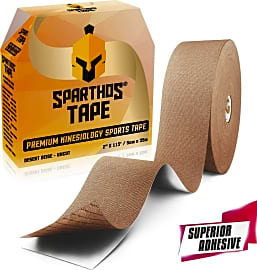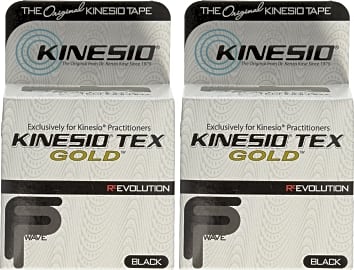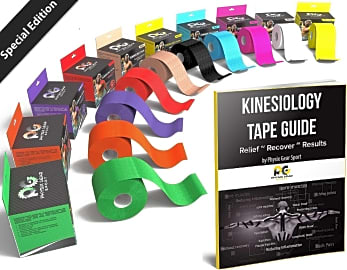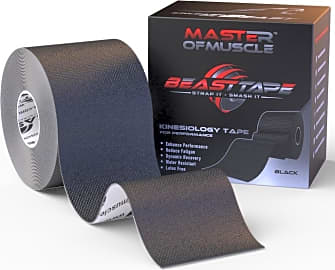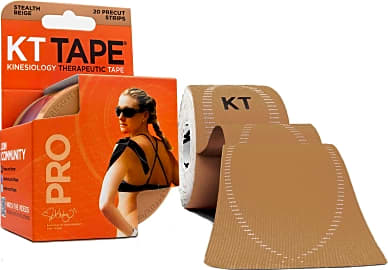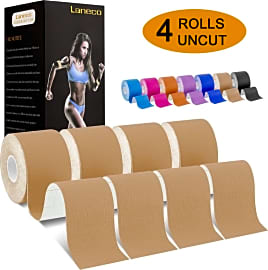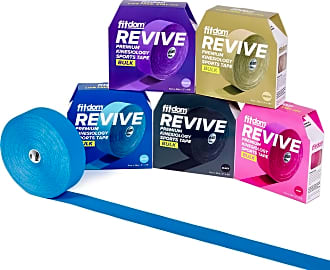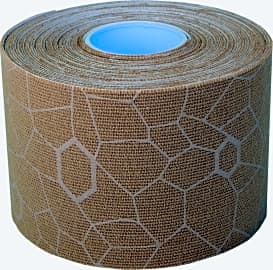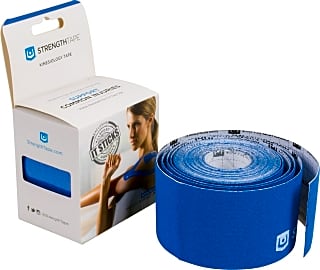The 10 Best Kinesiology Tapes

This wiki has been updated 39 times since it was first published in February of 2017. As the study of kinesiology has become more advanced, new products have been developed to aid in muscle recovery, injury prevention and more. Kinesio tape is a prime example. It is increasingly popular in the world of professional sports and has caught on with athletes at all levels due to its claimed properties, such as the ability to enhance performance and provide joint support. When users buy our independently chosen editorial recommendations, we may earn commissions to help fund the Wiki.
Editor's Notes
July 23, 2020:
While kinesiology tapes have a lot of similarities, they also have some subtle differences that can make a difference in how they perform, and also how easy they are to apply correctly. For example, whether you are just trying out this tape for the first time or have been using it for a long time, anyone can benefit from the stretch indicators on TheraBand XactStretch. It features two sizes of hexagons that indicate a 25-percent and 50-percent stretch to reduce the possibility of misapplication. Laneco Latex-free 4-Pack, Fitdom Revive, and StrengthTape Uncut all have grid lines on the back that help guide you when cutting them into specific shapes, and make it easy to cut duplicates and triplicates of those shapes so you get the exact same level of support every time.
Those who often run outdoors at night should look to KT Tape Pro, since it incorporates reflective lines to alert drivers of your presence. Those same lines can also offer some indication of how much you are stretching the tape during application. That being said, we still recommend you wear a headlamp just to be extra cautious. Not only will they also help driver's see you, but they can illuminate the ground ahead and potentially prevent an injury from stepping on an unseen obstacle.
We like Kinesio Gold FP because it is one of the stretchiest options on the market, yet is still extremely supportive. This means you'll get joint stability without any feeling that your range of motion is being restricted. Plus, it comes from the man first credited with developing and refining the kinesiology taping concept, so he should know a thing or two about it. In the same right, Rock Tape H20 is said to be trusted by over 50,000 medical professionals, and if it is good enough for them, it is good enough for us.
September 10, 2019:
The efficacy of kinesiology tape may still be unproven, but many professional and amateur athletes swear by it. So if you have an injury or feel like you could use a little performance boost, why not give it a try? It is affordably priced and definitely won't negatively impact your training. And who knows, it may prevent you from having to reach for that cold pack after your next hard workout.
While they may all look exactly alike at first glance, there are actually subtle differences in them that can play a major role in how useful they are. For example, if you often run at night, you'll want to look at the solid color options of KT Tape Pro, since they feature reflective lines to increase safety. Along with KT Tape Pro, Rock Tape H20 and Fitdom Revive come in both rolls and pre-cut strips to suit all application styles.
When it comes to cutting, we think users will appreciate the grid lines on the backs of Fitdom Revive, StrengthTape Uncut, and the rolls in the Laneco 4-Pack. This makes it easier to cut specific shapes, as well as produce strips with a consistent length.
Similarly to how the grids on the reverse side can help with the cutting of the aforementioned models, TheraBand XactStretch has a pattern that helps you gauge how much you are stretching the tape during application. This should help you to produce the same amount of supportive pressure every time you apply new strips.
Special Honors
Don Joy Performance Kinesiology Tape Don Joy Performance Kinesiology Tape is available in three colors, one of which is a cool camo, and has a lightweight cotton construction, so it is nice and breathable. It offers 100-percent elasticity to move with your body and comes in a 10-foot roll you can cut to size. donjoyperformance.com
How Kinesiology Tape Works
This is even more true for athletes, whose identities are thoroughly intertwined with performing in their given sports.
Few things in life are more frustrating than an injury. Any kind of trauma to your body that keeps you from living your life as you normally would is a hassle at best and a source of deep depression at worst. This is even more true for athletes, whose identities are thoroughly intertwined with performing in their given sports. Sitting on the sidelines is agonizing.
A few years back, I suffered a shoulder injury during a hockey game, and I had to sit out the rest of the season and the playoffs. Watching my team struggle from the stands and eventually lose was hard. Recovering from that injury, however was not. That’s mainly because my chiropractor outfitted me with kinesiology tape.
You may have heard of kinesiology tape as KT tape, as well. That stands for Kinesio Tex tape, from the original design (more on that below). Whatever you choose to call it, it’s one of the few things you can do for an injury beyond the traditional rest, ice, compression, elevation regimen that’s where most home treatment ends.
That’s because kinesiology tape, when properly applied, actually mimics the tension of your muscles and tendons were they to be in proper functioning form. You see, when you injure a tendon in the shoulder, for example, that puts added stress on neighboring tendons and muscles. Even more problematic for recovery is the fact that the weight of the arm itself, in addition to any sudden movements, will impose additional stress on the injured tissue.
By mimicking a baseline tension and function for a given area of muscle or tendon, kinesiology tape takes a tremendous amount of that stress off of both the injured tissue and the neighboring support structure. As a result, the injury can heal faster, and with less pain.
Of course, this can only work if you have a thorough understanding of human anatomy and physiology, right? Well, fortunately, while very smart people developed the methods for applying kinesiology tape, you don’t have to have a medical degree to put it on yourself. You may need an extra pair of hands to get the job done depending on where your injury is, but it’s certainly something you can do at home.
Which Kinesiology Tape Is Right For You?
A cursory glance at the wide array of kinesiology tape options on the market might lead you to believe that you can just buy whichever roll is the cheapest and the longest, and you’ll be good to go. A deeper look proves that there are enough subtle differences among brands to warrant further investigation before you add any one roll to your shopping cart.
For starters, kinesiology tape is designed to stay in place for several days after you apply it. More expensive options usually utilize stronger adhesives that are also very easy on the skin, where some of the knock-off options out there either peel off your skin too soon, or can cause a significant amount of discomfort.
Some tapes are stiffer than others, which is only rarely an advantage when trying to heal from an injury.
The strength and flexibility of the backing material are also extremely important, as well. Some tapes are stiffer than others, which is only rarely an advantage when trying to heal from an injury. And if that backing material isn’t quite strong enough, then small tears can occur at critical points in the dressing. These can add up to eventually nullify any therapeutic benefits of the taping job.
Beyond those vital factors, many kinesiology tapes offer other features that can make one purchase much smarter than another. Some brands come in multiple colors, for example, the brightest of which are ideal for nighttime runners who want to increase their visibility. You might even find an option or two with reflective material built in for even better nighttime safety.
You can also decide between precut and uncut rolls of tape. Precut rolls are often targeted at specific muscle groups or areas of the body, and may not be long enough for certain injuries. That said, they can save you the hassle of cutting tape down to size if they’re a good fit right off the role. On the flip side, uncut tapes allow you to create custom lengths for specific injuries on any part of the body.
Occasionally, you’ll see additional features like integrated negative ions or silver, both of which have been shown in some studies to increase the rate of recovery in certain types of injuries. If you put any stock in those remedies, then there’s a specific brand out there with your name on it.
Perhaps most importantly, look for a brand that either comes with detailed instructions for a variety of injuries, or has an associated website that can teach you the basics of the taping method. That way, you’ll know you’ve applied it correctly, and you can let the healing begin.
A Brief History Of Kinesiology Tape
Before kinesiology tape came along, most of the taping methods used in athletics and medical fields were designed to provide support to an injured area, and often to provide a little compression, as well. In some cases, this would be enough to help with the healing process, or at least to relieve the area of additional stress while healing took place. In other cases, it could actually cause a decrease in the healing rate due to circulation and positioning issues.
In the 1970s, Dr. Kenzo Kase, a Japanese sports physician, recognized some of these problems, and sought better ways to tape up certain injuries. Dr. Kase’s work led to the majority of kinesiology taping techniques still in use today, and his organization in the United Kingdom has trained over 4,000 certified professionals in the field. Beyond their ranks, practitioners of sports medicine and chiropractors around the world have begun to use kinesiology tape as a go-to material for the vast majority of sports related injuries.
Since Dr. Kase released his tape to the market, countless competitors have cropped up, looking to get a slice of the pie. Many were inferior imitators, but a few found ways to make the product more effective, convenient, and durable, leading to the array you see on our list today.


